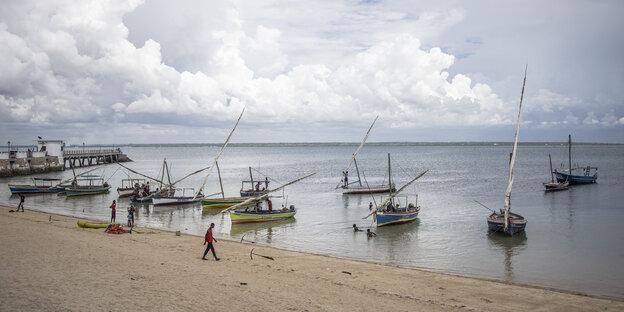At least 97 people die in a serious boat accident off the coast of Mozambique. They wanted to escape from the mainland to an island.

View of a beach in the town of Nampula, which is located between the Mozambique Channel and Mossuril Bay on the island of Mozambique Photo: Juan Luis Rod/Picture Alliance
SEDAN taz | At least 97 people drowned off the coast of Mozambique on Monday night. This is not an overcrowded refugee ship on its way to Europe, but the circumstances are no less dire.
About 130 people were on the small wooden fishing boat that set sail from the fishing port of Lunga on Sunday afternoon. They reportedly wanted to leave because a government cholera control campaign was about to begin there. The sudden arrival of the doctors convinced the local population that their lives were in danger, journalists present reported. Too many people were crammed into a single small boat to sail toward the supposedly safe sea.
The Mozambican province of Nampula, the scene of the incident, is the center of a cholera epidemic that has caused 32 deaths in Mozambique since October. This is a moderate balance compared to neighboring countries.
But in northern Mozambique, the humanitarian situation is particularly precarious due to the war against Islamist rebels, who are part of the global “Islamic State”, which has continued since 2017. According to the UN, more than 700,000 people in Mozambique are currently fleeing due to the war, especially from the most affected northern province, Cabo Delgado, to the neighboring province of Nampula.
Great distrust of the state.
Given that the Mozambican army also commits serious human rights violations, displaced Muslims in particular are extremely distrustful of any state authority; Maputo, the capital of Mozambique, is 1,400 kilometers further south.
The destination of Lunga's fishing boat was reportedly the island of Mozambique, about 20 kilometers further north, but a few kilometers from the mainland and connected to it by a bridge.
The island of Mozambique, declared a World Heritage Site, was the capital of Portuguese East Africa until 1898, the year to which it gave its current name. For centuries it was an important stop on the sea route between Asia and Europe through the African continent before it was moved to the Red Sea with the construction of the Suez Canal.
During the Portuguese tyranny that ended in 1975, state health campaigns in remote areas of Mozambique always served to expand state control. Even after independence, government cholera vaccination teams in the north of the country were reported to have been attacked because they were accused of bringing the disease with them. Islands off the coast were common refuges for people to seek safety in the state.